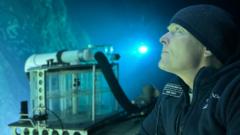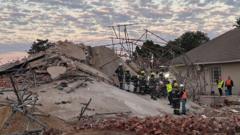Lochridge alleges negligence from Oceangate and regulatory failures contributed to the fatal incident.
**Oceangate’s Titan Disaster: Whistleblower Speaks Out on Safety Failures**

**Oceangate’s Titan Disaster: Whistleblower Speaks Out on Safety Failures**
David Lochridge claims systemic issues led to the Titan submersible tragedy.
In June 2023, the Titan submersible tragically imploded during a dive to the Titanic wreck, leading to the deaths of five onboard, including Oceangate's CEO, Stockton Rush. David Lochridge, who was terminated in 2018 after raising safety concerns, voiced his deep apprehension about the company’s practices, stating, "People were sold a lie.” A report from the US Coast Guard identified significant failures in Oceangate regarding safety protocols, maintenance, and testing, rendering the company culpable for the disaster.
Lochridge had joined Oceangate as Director of Marine Operations, driven by the ambition of leading a groundbreaking project where paying customers could explore the Titanic site. With over 25 years of experience at sea, including submarine pilot operations, he felt confident in addressing potential risks involved with such deep dives. He initially collaborated with the University of Washington on designing Titan, but soon lost faith after the project was modified and progressed in-house.
His persistent worries about construction flaws, particularly the carbon fibre hull, grew as he flagged issues with the vessel's safety. Lochridge reported visible structural problems and questioned the decision to not pursue independent safety certification, mentioning that he encountered resistance whenever he raised these grievances with management.
Despite his commitment to safety, Lochridge was terminated soon after submitting a report outlining his concerns. Following his dismissal, he contacted the Occupational Safety and Health Administration (OSHA), leading to a slow-moving investigation. He faced escalating legal pressures from Oceangate, which ultimately compelled him to withdraw his complaints and surrender to a non-disclosure agreement.
Since Titan's ill-fated dive, Lochridge has criticized OSHA and the USCG for not acting decisively when he raised alarms about potential risks. The USCG’s subsequent findings acknowledged that missed opportunities for intervention could have averted the tragedy. Ultimately, Lochridge insists that there should have been more stringent oversight, stating, "It didn’t need to happen. It should have been stopped." Following the incident, Oceangate announced a complete halt of its operations while cooperating with ongoing investigations.
Lochridge had joined Oceangate as Director of Marine Operations, driven by the ambition of leading a groundbreaking project where paying customers could explore the Titanic site. With over 25 years of experience at sea, including submarine pilot operations, he felt confident in addressing potential risks involved with such deep dives. He initially collaborated with the University of Washington on designing Titan, but soon lost faith after the project was modified and progressed in-house.
His persistent worries about construction flaws, particularly the carbon fibre hull, grew as he flagged issues with the vessel's safety. Lochridge reported visible structural problems and questioned the decision to not pursue independent safety certification, mentioning that he encountered resistance whenever he raised these grievances with management.
Despite his commitment to safety, Lochridge was terminated soon after submitting a report outlining his concerns. Following his dismissal, he contacted the Occupational Safety and Health Administration (OSHA), leading to a slow-moving investigation. He faced escalating legal pressures from Oceangate, which ultimately compelled him to withdraw his complaints and surrender to a non-disclosure agreement.
Since Titan's ill-fated dive, Lochridge has criticized OSHA and the USCG for not acting decisively when he raised alarms about potential risks. The USCG’s subsequent findings acknowledged that missed opportunities for intervention could have averted the tragedy. Ultimately, Lochridge insists that there should have been more stringent oversight, stating, "It didn’t need to happen. It should have been stopped." Following the incident, Oceangate announced a complete halt of its operations while cooperating with ongoing investigations.




















